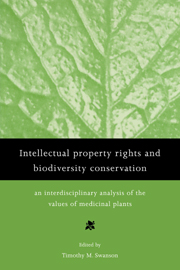 Intellectual Property Rights and Biodiversity Conservation
Intellectual Property Rights and Biodiversity Conservation Book contents
- Frontmatter
- Contents
- List of contributors
- Preface
- Acknowledgements
- 1 Diversity and sustainability: evolution, information and institutions
- Part A Plant communities and the generation of information
- Part B The value of plant-generated information in Pharmaceuticals
- 4 The pharmaceutical discovery process
- 5 The role of plant screening and plant supply in biodiversity conservation, drug development and health care
- 6 The economic value of plant-based pharmaceuticals
- Part C The institutions for regulating information from diversity
- Part D The importance of cultural diversity in biodiversity conservation
- Index
6 - The economic value of plant-based pharmaceuticals
Published online by Cambridge University Press: 21 January 2010
- Frontmatter
- Contents
- List of contributors
- Preface
- Acknowledgements
- 1 Diversity and sustainability: evolution, information and institutions
- Part A Plant communities and the generation of information
- Part B The value of plant-generated information in Pharmaceuticals
- 4 The pharmaceutical discovery process
- 5 The role of plant screening and plant supply in biodiversity conservation, drug development and health care
- 6 The economic value of plant-based pharmaceuticals
- Part C The institutions for regulating information from diversity
- Part D The importance of cultural diversity in biodiversity conservation
- Index
Summary
Introduction
There is increasing recognition that the economic rate of return to sustainable forms of natural resource use is both positive and capable of exceeding the returns to alternative forms of land use, such as agriculture and clear-felling for timber (Peters et al., 1989: Swanson and Barbier, 1992; Pearce and Moran, 1994). Where the rate of return analysis does favour the conservation of biological resources and biological diversity, the requisite land use will still not be realised if either: (1) the benefits of conservation have no marketable dimension (a form of ‘market failure’), or (2) governments intervene in the market place to distort economic signals in favour of exploitative land use that involves biodiversity loss. Clearly, then, two stages in the economic case for biodiversity conservation are: (1) demonstrating the economic value of biodiversity conservation, and (2) implementing mechanisms whereby those values can be appropriated and captured. We refer to these stages as the demonstration and appropriation stages in the process of conserving biodiversity.
This paper is concerned with the first stage of the argument: demonstration. It is concerned, moreover, with only one aspect of economic value: the form of use value reflected in the actual or potential and direct application of plants in the production of pharmaceuticals.
- Type
- Chapter
- Information
- Intellectual Property Rights and Biodiversity ConservationAn Interdisciplinary Analysis of the Values of Medicinal Plants, pp. 127 - 138Publisher: Cambridge University PressPrint publication year: 1995
- 6
- Cited by


